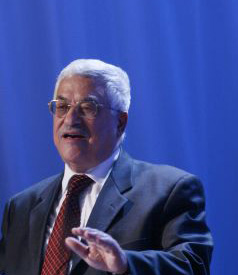Jerusalem – Palestinian Authority President Mahmoud Abbas says he’s made up his mind once and for all: There will be elections in January – and he will not be a candidate in them.
Mr. Abbas’s announcement Thursday night was the pinnacle of a dramatic day’s events in which he gathered together his closest allies and senior members of the PLO (Palestine Liberation Organization) to tell them that he was fed up and would not seek reelection.
Abbas’s statement comes on the heels of an intense but largely unsuccessful week of US diplomatic activity aimed at restarting Israeli-Palestinian peace talks, during which Secretary of State Hillary Clinton told the Palestinian president to come back to the negotiating table despite the lack of a freeze in Israeli settlement building in the West Bank.
In his speech, Abbas expressed disappointment in Israeli actions on settlements, and accused Israel of taking dangerous steps in Jerusalem as well as of “trying to destroy some holy sites around the Al Aqsa mosque,” which he said threatened religious war. He hinted at a desire for international mediation in the conflict beyond the US as chief peace-broker.
His comments seemed a clear complaint lobbed toward the Obama administration, seen by Palestinians and others across the Arab world as backpedaling from a harder line toward Israeli settlement growth. Mrs. Clinton’s praise for Prime Minister Benjamin Netanyahu’s limits on settlement growth, which she called unprecedented, have raised Palestinian ire about US evenhandedness.
In fact, some analysts see Abbas’s move as something of a final attempt to ring alarm bells for the US administration, perhaps to push it to more urgent action.
“We have pledged with Israel to reach [a] two-state solution,” he said. “However, month after month, year and year, we have seen nothing but complacency and procrastination, and all of this led to a tainting of the negotiations.”
Really leaving?
Abbas, who mentioned a variety of vexing factors – from an intransigent Hamas to an unsympathetic media – said that his decision not to run was not open “to debate or argument or bargaining at all.”
But Abbas has threatened to quit before.
Khalil Shaheen, a leading columnist from the al-Ayyam newspaper, says that members of Fatah, as well as US officials – not to mention some Israelis – will try to convince him to stay. And with Fatah and Hamas still far away from a national reconciliation agreement, Mr. Shaheen says, it looks unlikely that elections will actually take place on Jan. 24, as Abbas decreed. Hamas, in control of the Gaza Strip, says it won’t participate and rejected the call to elections.
Shaheen predicted that Abbas will be in office for many more months. “I don’t think there will be elections in January, and Abbas will have to stay until there are new elections, so no one is going anywhere so fast,” he says. “There will be pressure exerted on Abbas to change his mind. Fatah will continue to press him [and] may call demonstrations to show moral support for Abbas in the streets.”
US Pressed Too Hard
Shaheen says that although the Obama administration aimed to strengthen Abbas, it inadvertently weakened him by pressing too hard.
Abbas’s domestic popularity began to sink after President Barack Obama convinced him to meet Netanyahu during the United Nations General Assembly meeting in September, despite Abbas’s earlier pronouncement that he would not hold talks without a settlement freeze.
“The Americans, instead of supporting him, kept exerting more pressure on him and that caused him to lose popularity among Palestinians,” Shaheen says.
Abbas has also had increasingly difficulty in recent months managing internal affairs and was slow to do damage control on many occasions, in particular following the report of the UN investigation into the Gaza war, headed by South African Judge Richard Goldstone.
Both Abbas’s supporters in Fatah and his critics in Hamas were in an uproar last month when his representative in Geneva voted to postpone processing the report for six months. Hamas took to hanging posters of Abbas throughout Gaza calling him a traitor and allowing people to throw their shoes at his image, a deep insult in the Arab world.
“We’ve called for unity,” Abbas said in his nighttime speech at his headquarters in Ramallah. “Hamas has been trying to use some indefensible excuses to avoid signing this reconciliation agreement, namely the Goldstone report.”
Who Would Replace Abbas?
It’s unclear who would replace Abbas if he leaves the political scene. But Fatah officials in Ramallah note there’s no easy replacement, no one person who would sure to beat a Hamas candidate in an election. The most popular member of the Fatah faction, according to polls, is consistently Marwan Barghouti, who’s been in an Israeli jail for several years. And then there is Palestinian Prime Minister Salam Fayyad, who is respected internationally but doesn’t necessarily have a local power base.
“This is the Fayyad era,” says Abdallah Awwad, a political analyst in Ramallah. “America no long cares about Abbas or his political project. America is interested in an economic development project like Fayyad’s,” Mr. Awwad says, and the Americans “prefer to deal with him.”
Media that fights fascism
Truthout is funded almost entirely by readers — that’s why we can speak truth to power and cut against the mainstream narrative. But independent journalists at Truthout face mounting political repression under Trump.
We rely on your support to survive McCarthyist censorship. Please make a tax-deductible one-time or monthly donation.
